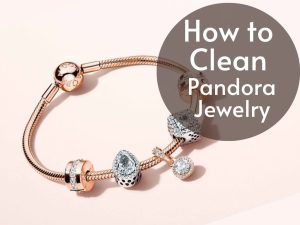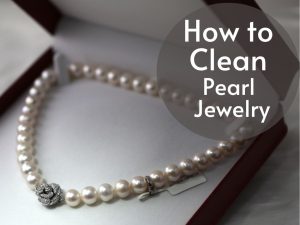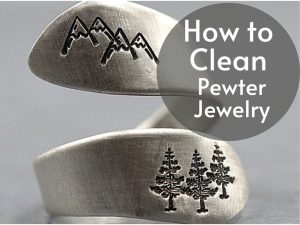Jewelry holds a special place in our hearts, symbolizing love, elegance, and personal style. Whether it’s a cherished heirloom passed down through generations or a fashionable statement piece, maintaining the sparkle and shine of jewelry is essential. Keeping your jewelry clean and well-maintained not only enhances its appearance but also preserves its value and longevity.
Importance of keeping jewelry clean and well-maintained
Imagine wearing a stunning diamond ring that has lost its brilliance due to dirt and grime accumulation. Not only does this diminish its overall beauty, but it also takes away from the joy that wearing such precious pieces brings. Regular cleaning ensures that your jewelry always dazzles in the light, capturing attention wherever you go.
Beyond aesthetics, cleanliness plays a vital role in preserving the quality of your jewelry. Dirt, oils from your skin, and environmental pollutants can build up on the surface over time, leading to tarnish or corrosion.
This is especially true for precious metals like gold, silver, or platinum which are susceptible to oxidation reactions with air or moisture. Furthermore, neglecting to clean your jewelry properly can result in irreversible damage.
For example, gemstones may become dull or scratched if not cared for correctly. Additionally, dirt trapped between tight settings can loosen stones or weaken prongs over time.
Benefits of regular cleaning
The advantages of regularly cleaning your jewelry extend far beyond mere appearance enhancement. By taking the time to clean your pieces on a consistent basis:
- You maintain their value: Properly cleaned and maintained jewelry retains its worth over time. Whether you plan on passing down heirlooms as family treasures or potentially selling pieces in the future, regular cleaning helps preserve both sentimental value and financial investment.
- You prevent damage: Removing dirt and grime from your jewelry prevents the accumulation of harmful substances that can cause deterioration or corrosion. By taking preventive measures, you ensure that your pieces retain their original beauty and structural integrity.
- You avoid skin irritation: Oils, lotions, and other substances build up on jewelry when worn frequently. These residues can cause skin irritation or allergies. By keeping your jewelry clean, you reduce the risk of adverse reactions and enjoy wearing them comfortably.
- You exude confidence: Wearing clean, sparkling jewelry not only enhances your personal style but also boosts your confidence. Knowing that your accessories are well-maintained allows you to shine with self-assurance in any social or professional setting.
- You showcase attention to detail: Taking care of your jewelry demonstrates a sense of responsibility and attention to detail. It reflects positively on your overall character and shows others that you value the things you own.
Overview of the cleaning process
The process of cleaning jewelry varies depending on factors such as the type of metal or gemstone involved. Generally, it involves several steps: preparation, cleaning, rinsing, and drying.
For precious metals like gold or silver, soaking in warm soapy water followed by gentle scrubbing with a soft brush is effective in removing dirt and restoring shine. On the other hand, gemstones require more delicate treatment as certain cleaning methods can damage their surface or loosen them from their settings.
Costume jewelry made with non-precious materials often requires only a gentle wipe-down using a damp cloth with mild soap solution. To ensure optimal results while minimizing risks to your precious pieces, it is crucial to understand these distinctions within each category of jewelry when proceeding with the cleaning process.



Precious Metals: Characteristics and Care Tips
Precious metals such as gold, silver, and platinum are treasured for their beauty and durability. However, each metal type has its unique characteristics that require specific care to maintain their luster and prevent damage. Gold is a highly sought-after metal known for its timeless appeal.
It is relatively soft compared to other metals, which makes it susceptible to scratches and dents. To keep your gold jewelry looking its best, avoid wearing it during activities that could expose it to harsh chemicals or rough surfaces.
Cleaning gold jewelry is relatively simple – soak it in warm water mixed with a mild dish soap for a few minutes, then gently scrub with a soft-bristle toothbrush to remove any dirt or residue. Silver possesses a stunning shine but is prone to tarnish over time due to exposure to air and moisture.
Regular wear can help prevent tarnish by keeping the metal polished. To clean silver jewelry, create a paste using baking soda mixed with water until it forms a thick consistency.
Apply the paste onto the tarnished areas using a soft cloth or sponge in circular motions, then rinse thoroughly and pat dry. Platinum is known for its strength and durability, making it an excellent choice for jewelry that withstands daily wear.
Unlike gold or silver, platinum does not tarnish; however, it may develop scratches over time due to normal use. To clean platinum jewelry gently wipe it with mild soapy water using a soft cloth or brush specifically designed for precious metals.
Gemstones: Identifying Types & Special Considerations
Gemstone jewelry adds elegance and color to any collection; however, different gemstones require specific cleaning approaches due to variations in hardness and sensitivity. Diamonds are prized not only for their brilliance but also their toughness as the hardest mineral on Earth. Cleaning diamond jewelry involves soaking the piece in warm water mixed with mild dish soap, then gently scrubbing with a soft-bristle brush to remove dirt or debris.
Be cautious when cleaning diamond jewelry with additional gemstones, as some stones may be more delicate and require specific care. Emeralds are vibrant green gemstones known for their captivating beauty.
However, emeralds are relatively softer and more fragile compared to diamonds. To clean emerald jewelry, use a mild solution of warm water mixed with a few drops of gentle dish soap.
Avoid using ultrasonic cleaners or harsh chemicals as they can damage the stone’s surface. Sapphires come in various colors and are highly durable gemstones.
Cleaning sapphire jewelry involves soaking it in warm soapy water and gently wiping it with a soft cloth or brush. Avoid using abrasive materials or harsh chemicals that may scratch or damage the stone.
Costume Jewelry: Materials & Cleaning Techniques
Costume jewelry encompasses fashion accessories made from non-precious materials like base metals, glass, plastic, and synthetic gemstones. Although not as delicate as precious metals or gemstones, costume jewelry requires proper care to maintain its appearance and longevity.
Materials commonly used in costume jewelry include brass, copper, stainless steel, rhinestones, beads, and acrylics. These materials are susceptible to tarnish and discoloration if exposed to moisture for extended periods or if stored improperly.
To clean costume jewelry effectively without damaging it, dampen a soft cloth in mild soapy water and gently wipe the surfaces. Rinse thoroughly under running water while ensuring all soap residue is removed before patting dry.
Avoid submerging costume jewelry with glued components into water since this can cause the adhesive to weaken or dissolve. Instead of immersing these pieces entirely during cleaning, focus on wiping them delicately using a slightly dampened cloth.
By understanding the characteristics of different types of jewelry and employing appropriate cleaning techniques tailored to each material’s needs, you can ensure that your cherished pieces remain radiant and well-maintained for years to come. Remember, when in doubt about the best cleaning method for a specific piece, consult a professional jeweler for guidance.
General Cleaning Techniques for Jewelry
Basic Supplies Needed
When it comes to cleaning your cherished pieces of jewelry, having the right supplies can make all the difference. Firstly, a soft-bristle toothbrush or a specialized jewelry brush should be in your arsenal.
These tools are perfect for gentle scrubbing and reaching intricate areas without causing any damage. Secondly, opt for a mild dish soap specifically formulated for jewelry cleaning or invest in a specialized jewelry cleaner that suits your needs.
These cleaners are designed to effectively remove dirt and grime without harming the metal or gemstones. Always have a microfiber cloth or lint-free cloth on hand to dry and polish your jewelry after cleaning.
Cleaning Process Step-by-Step
- Preparation: Removing any dirt or debris from the surface
Before diving into the actual cleaning process, it is essential to prepare your jewelry by removing any visible dirt or debris. Use a soft brush with gentle bristles to carefully brush off any loose particles that may have accumulated on the surface of your jewelry.
This step helps prevent scratching when you move on to deeper cleaning. Inspect your precious pieces closely before proceeding further.
Look out for loose stones or damaged parts that may require professional attention before cleaning them yourself. It’s better to address these issues beforehand rather than risk exacerbating them during the cleaning process.
- Cleaning: Using appropriate methods based on the type of jewelry
Different types of jewelry require different cleaning techniques due to their varying materials and structures. For precious metals like gold, silver, and platinum, soak them in warm soapy water (using a mild dish soap) for about 15-20 minutes. Gently scrub each piece with a soft toothbrush to remove any stubborn dirt or tarnish buildup.
Be cautious not to use excessive force as this can scratch delicate metals such as silver. Gemstone jewelry demands extra care.
Harsh chemicals can cause damage to gemstones, so it’s crucial to avoid using them. Instead, use a soft cloth dampened with water or a mild jewelry cleaner specifically formulated for gemstones.
Gently wipe the surface of the gems, paying attention to any crevices or settings that may trap dirt. Costume jewelry requires a gentle touch as well.
Use a damp cloth with a mild soap solution to wipe away any dirt or residue accumulated on these fashion accessories. Make sure not to immerse costume jewelry in water, as this may cause the glue holding certain elements together to weaken.
- Rinsing: Thoroughly removing all
After cleaning your jewelry using the appropriate methods, it is crucial to rinse off any remaining soap residue thoroughly. Run your pieces under warm water and gently pat them dry with a microfiber cloth or lint-free cloth. Ensure that no moisture remains trapped in crevices or settings as this can lead to tarnishing or damage over time.
Conclusion
Taking care of your precious jewelry by regularly cleaning and maintaining it not only ensures its longevity but also preserves its beauty for generations to come. By following the proper cleaning techniques and using the right supplies, you can keep your gold, silver, platinum, gemstone, and costume jewelry looking exquisite at all times.
Remember that each piece is unique and may require specific care; therefore, always consult professionals when in doubt about cleaning certain types of jewelry such as heirlooms or antique pieces. Embrace the joy of wearing sparkling and radiant accessories knowing they are clean and well-cared for!
















